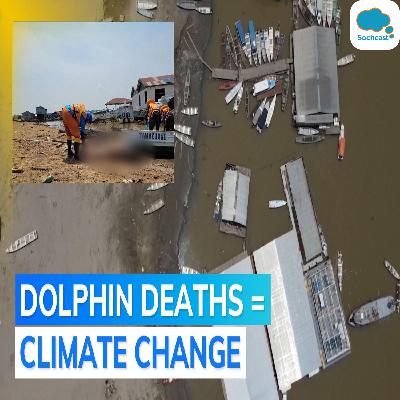Discover World News - English
World News - English

World News - English
Author: Editorji Podcast
Subscribed: 28Played: 469Subscribe
Share
© Copyright 2022 Editorji Podcast
Description
World News Videos: Get the latest international news & watch breaking world news videos from across the globe on editorji. Our world news headlines cover politics, crime, celebrity and sports.
3604 Episodes
Reverse
Ever wondered how astronauts enjoy their morning coffee while floating around in the vastness of space? Well, it's not as simple as brewing a cup in your kitchen and sipping it from your favourite mug. Astronauts have a pretty cool and unique way of enjoying their coffee while they're out there in the space. Why you can't use a regular cup in space? Imagine you're in a spaceship, and you're about to enjoy a cup of coffee. First things first, you can't use a regular cup. Why? Because in space, there's no gravity to keep your coffee in the cup. It would just float away like magic! So, astronauts use specially designed space cups to keep everything under control. What makes the space cups special? These cups have a special shape that gives the angle to make the coffee flow to the edge per capillary action. The best part? These special cups and pouches keep the coffee from floating away, so astronauts can enjoy their caffeine fix without worrying about it escaping into the spaceship. So there you have it, space coffee in a nutshell! Astronauts get to enjoy their daily dose of coffee in a pretty unique way, with special cups. It's just one of the cool things that make life in space a bit different from life on Earth. Cheers to astronauts and their cosmic coffee adventures! But that's not the only clever part of the equation. The coffee itself is also specially prepared for space. Instead of your usual brewed coffee, astronauts have coffee pouches filled with freeze-dried coffee granules. When they're ready for a cup of coffee, they inject hot water into these pouches. This rehydrates the coffee, turning it into a delicious, aromatic brew. Then, with their trusty straw, they can sip it from the specially designed cup without any worry of floating coffee droplets escaping into the spaceship. Also watch: NASA astronaut Frank Rubio breaks US record for longest spaceflight
Shi Hailin, an athlete from China, must have felt on top of the world, quite literally as he claimed the Guinness World Record for the fastest 100 m slackline walk. But the impressive part about this walk is that he did it in just 1 minute 14.198 seconds. The Guinness World Record said Hailin did the bold stunt 1,600 m above sea level at the Guanyindang camp in Mount Wugong in Pingxiang province of China. Hailin walked for more than 222 meters on a wobbly rope that was way up high between two hills. He was also timed while he walked a distance of 100 meters on that rope. Shi Hailin broke the previous 2016 record achieved by Lucas Milliard Hailin beat a record that was set in 2016 by Lucas Milliard from France. Lucas had completed the challenge in 1 minute and 59.73 seconds, but 31-year-old Chinese was even faster! While speaking to Guinness World Records.com, Hailin said that he hopes to draw more attention to this aerial sport through his attempt. Social media users' react to Shi Hailin's world record As internet users came across the video of Hailin balancing his way out on the rope, they were impressed by it. Several social media users reacted by saying that this man can balance any country's economy and budget. Others reacted by saying that this is pure talent. It is also worth taking note that Hailin developed a passion for this sport in 2016 and has emerged as a leading athlete. Also watch: Video: 104-year-old Chicago woman skydives from plane, eyes world record
Republican presidential candidate Nikki Haley has said that the Trump Campaign sent her a birdcage and bird food in the aftermath of her impressive performance on the debate stage last week. Haley has been polling second after Trump in some of the key early primary and caucus states like Iowa, New Hampshire, and South Carolina. In the immediate aftermath of last week’s GOP primary debate, the Trump campaign issued a string of statements against Haley. Early Sunday, the Trump Campaign left a birdcage along with some bird food outside Haley’s hotel room in Iowa, where she was campaigning, the former South Carolina Governor and the US ambassador to the United Nations said. Haley also posted a picture of the birdcage and said, “After a day of campaign, this is the message waiting for me outside my hotel room.” “This behavior is weird, creepy, and desperate from a former president feeling the pressure,” Betsy Ankney, Haley’s campaign manager, told The New York Post in a statement. “It’s more proof that it’s time to leave the drama behind. America is better than this. Let’s go,” she said. Trump went on his Truth Social to attack Haley. “MAGA, or I, will never go for Birdbrain Nikki Haley,” Trump wrote in a post. “Birdbrain doesn’t have the TALENT or TEMPERAMENT to do the job. MAKE AMERICA GREAT AGAIN!” wrote the former president, who is seeking to get the GOP’s presidential nomination for the third consecutive term. She was at least arguably the winner of the first two GOP debates, no easy task for a woman dealing with a pack of shouting men, it said. “That’s why the more GOP voters see of her, the more they like her. To make matters worse, Trump and his team were so proud of themselves that, like schoolkids, they came up with a harebrained plan to send a birdcage and some bird food to Haley’s hotel room door in the middle of the night,” the daily said.
The US government has issued its first fine to a company that violated its anti-space debris rule. The US Federal Communications Commission has asked Dish Network to pay $150,000 over its failure to de-orbit its EchoStar-7 satellite which has been in space since 2002. Dish Network in 2012 had agreed to an orbital debris mitigation plan that would send its satellite into a 'graveyard orbit' where it would not be a risk to other active satellites.Instead of properly de-orbiting the satellite, Dish sent it into a “disposal orbit” at an altitude low enough to pose orbital debris risk.
A 104-year-old Chicago woman is hoping to be certified as the oldest person to ever skydive after making a tandem jump from 13,500 feet in northern Illinois. The Chicago Tribune reports Dorothy Hoffner told a cheering crowd that “age is just a number” moments after she touched the ground Sunday at Skydive Chicago in Ottawa, Illinois. She made the jump while tethered to a certified instructor. The Guinness World Record for the oldest skydiver was set in May 2022 by 103-year-old Linnéa Ingegärd Larsson from Sweden. But WLS-TV reports that Skydive Chicago is working to have Guinness World Records certify Hoffner’s jump.
More than 100 dolphins died in the Brazilian Amazon rainforest in the past week due to a severe drought in the region, and many more could also expire soon if water temperatures remain high. The Mamiraua Institute, a research body of Brazil’s Ministry of Science, Technology and Innovation, said two more dead dolphins were found on Monday in the region of Tefe Lake, which is key for mammals and fish in that area. Thousands of fish have also died, according to local media. Experts believe the high temperatures of the waters are the most likely reason for the mortality in the region. Temperatures have exceeded 39 degrees Celsius (102 degrees Fahrenheit) in some parts. Miriam Mamontel has been working with Amazon dolphins for 30 years and says she has never seen anything like it, explaining that the deaths amount to 5 to 10% of the population of the two species of freshwater dolphin in Tefe Lake. Before the recent deaths, some 900 river dolphins and 500 Tucuxis inhabited the lake, Mamontel estimated. The state of Amazonas is facing an extreme drought that is affecting 60 out of the 62 cities in the state, leaving many communities isolated, as rivers are the main form of transportation. The Mamiraua Institute has warned that water temperatures may rise again in the next few days and could affect even more animals.
A scientist associated with The Netherlands-based Seismological Research Institute Solar System Geometry Survey has claimed that a strong earthquake could hit Pakistan between October 1 to October 3. The seismic organisation noted that strong underground tremors have been recorded along the Chaman fault line in Balochistan. Pakistan has the largest fault line in South Asia called the Chaman fault system, it is 900 km long. The Chaman fault separates the Eurasian Plate from the Indo-Australian Plate. It is along this fault line that a terrible earthquake occurred in Quetta on May 31, 1935, killing thousands of people. Areas of Afghanistan and Pakistan fall in this fault line. The SSGS reasoned that fluctuations of electric charge in the atmosphere near the sea level have been recorded, due to which some areas including Pakistan's Balochistan province may experience powerful earthquakes in the next few days. According to SSGS, the areas defined are only approximations and there is currently no reliable way to determine exact locations. The SSGS has declared the Chaman fault line as a region of high-potential seismicity The scientist who made the prediction is Frank Hoper Bates. He had tweeted on February 3 and said that sooner or later an earthquake of magnitude 7.5 will occur in South Central Turkey, Jordan, Syria and Lebanon. His prediction came to be true 3 days later. Nearly 60,000 people died in the earthquake that struck Turkiye and Syria on February 3. However, according to the US Geological Survey, earthquakes cannot be predicted with pinpoint accuracy. One can predict the probability of a quake in certain areas within a certain timeframe but the exact date, time and location can't be predicted. Also Watch: Pakistan's seismic agency rejects Dutch scientist's 'prediction' of strong earthquake
Katalin Karikó, the Hungarian scientist who won this year's Nobel Prize for medicine along with her research partner Drew Weissman recalled how 10 years ago she had been forced to retire. In her first reaction to winning the Nobel Prize for her discoveried about mRNA that contributed to the development of Covid-19 vaccines, Kariko said that she was thrown out of University of Pennsylvania 10 years and forced to retire. She added that 10 years ago she was still doing all her experiments by hand. The Nobel committee said Kariko and Weissman 'through their groundbreaking findings, which have fundamentally changed our understanding of how mRNA interacts with our immune system, contributed to the unprecedented rate of vaccine development during one of the greatest threats to human health in modern times.' Also Watch: Sikh businessman's car shot at, vandalised by Khalistan supporters in UK
Two scientists won the Nobel Prize in medicine on Monday for discoveries that enabled the development of effective mRNA vaccines against COVID-19. The award was given to Katalin Karikó, a professor at Sagan's University in Hungary and an adjunct professor at the University of Pennsylvania, and Drew Weissman, who performed his prizewinning research together with Karikó at the University of Pennsylvania. "Through their groundbreaking findings, which have fundamentally changed our understanding of how mRNA interacts with our immune system, the laureates contributed to the unprecedented rate of vaccine development during one of the greatest threats to human health in modern times,” the panel that awarded the prize said. Thomas Perlmann, secretary of the Nobel Assembly, announced the prize and said both scientists were “overwhelmed” by news of the prize when he contacted them shortly before the announcement. The Nobel Prize in physiology or medicine was won last year by Swedish scientist Svante Paabo for discoveries in human evolution that unlocked secrets of Neanderthal DNA which provided key insights into our immune system, including our vulnerability to severe COVID-19. The award was the second in the family. Paabo's father, Sune Bergstrom, won the Nobel Prize in medicine in 1982. Nobel announcements continue with the physics prize on Tuesday, chemistry on Wednesday and literature on Thursday. The Nobel Peace Prize will be announced Friday and the economics award on October 9. The prizes carry a cash award of 11 million Swedish kronor (USD 1 million). The money comes from a bequest left by the prize's creator, Swedish inventor Alfred Nobel, who died in 1896. The prize money was raised by 1 million kronor this year because of the plunging value of the Swedish currency. The laureates are invited to receive their awards at ceremonies on December 10, the anniversary of Nobel's death. The prestigious Peace Prize is handed out in Oslo, according to his wishes, while the other award ceremony is held in Stockholm.
Pakistan's National Seismic Monitoring Centre has rejected claims by a Dutch scientist that a strong earthquake could hit the country's Balochistan region between October 1 and 3, Samaa TV reported. The agency said that it is not possible to accurately predict the time of an earthquake, according to the report. It added that many predictions of the Solar System Geometry Survey have been wrong in the past. Also Watch: Scientist claims strong earthquake will hit Pakistan in next 2 days. Can they be predicted accurately?
The seismological research tnstitute Solar System Geometry Survey (SSGS) has predicted that a powerful earthquake may occur in Pakistan's Balochistan area in the next few days, according to Pakistan media reports. It claimed that the magnitude of the quake may be 6 or more. Pakistan 's GEO TV reported that The Netherlands-based organisation known for its seismic observations and predictions noted that strong tremors have been recorded in the underground Chaman fault line in Pakistan's Balochistan. The SSGS reasonsed that fluctuations of electric charge in the atmosphere near the sea level have been recorded, due to which some areas including Pakistan's Balochistan province may experience powerful earthquakes in the next few days. According to SSGS, the areas defined are only approximations and there is currently no reliable way to determine exact locations. The SSGS has declared the Chaman fault line as a region of high potential seismicity The scientist who made prediction is Frank Hoper Bates. He had tweeted on February 3 and said that sooner or later an earthquake of magnitude 7.5 will occur in South Central Turkey, Jordan, Syria and Lebanon. His prediction came to be true 3 days later. Nearly 60,000 peple died in the earthquake that struck Turkiye and Syria on February 3. However, according to the US Geological Survey, earthquakes cannot be predicted with pinpoint accuracy. One can predict probability of a quake in certain areas within a certain timeframe but exact date, time and location can't be predicted. Also Watch: 6 persons killed in clash over land dispute in UP's Deoria
Indonesian President Joko Widodo inaugurated Southeast Asia's first high-speed railway on Monday as it was set to begin commercial operations, a key project under China's Belt and Road infrastructure initiative that will drastically reduce the travel time between two key cities. The project has been beset with delays and increasing costs, and some observers doubt its commercial benefits. But Widodo has championed the 142-kilometre (88-mile) railway, which was issued its official operating license from the Transportation Ministry on Sunday. The USD 7.3 billion project, largely funded by China, was constructed by PT Kereta Cepat Indonesia-China, known as PT KCIC, a joint venture between an Indonesian consortium of four state-owned companies and China Railway International Co. Ltd. The railway connects Jakarta with Bandung, the heavily populated capital of West Java province, and will cut travel time between the cities from the current three hours to about 40 minutes. Its use of electrical energy is expected to reduce carbon emissions. Widodo in his opening remarks officially named Indonesia's first high-speed railway — the fastest in Southeast Asia, with speeds of up to 350 kph (217 mph) — as “Whoosh,” from “Waktu Hemat, Operasi Optimal, Sistem Handal,” which means “timesaving, optimal operation, reliable system” in Indonesian language. Also Watch: CCTV footage shows suicide bomber carrying out blast near Turkish Parliament “The Jakarta-Bandung high-speed train marks the modernisation of our mass transportation, which is efficient and environmentally friendly,” Widodo said. “Our courage to try new things gives us confidence and the opportunity to learn and will be very useful for the future, making our human resources more advanced and our nation more independent,” he added. Widodo, along with other high-ranking officials, rode Whoosh from its first station, Halim in eastern Jakarta, to Bandung's Padalarang station, one of the line's four stations, located about 30 kilometres (18 miles) from the central area of Bandung. He took a 25-minute test ride on the train on September 13 and told reporters that he felt comfortable sitting or walking inside the bullet train even at its top speeds. Chinese Premier Li Qiang took a test ride early last month while visiting Jakarta for three days of talks with leaders of the Association of Southeast Asia Nations and other countries. Luhut Binsar Pandjaitan, the coordinating minister for maritime and investment, said China Railway has agreed to transfer its technology to Indonesia so that in the future the country's high-speed trains can be made domestically. For two weeks leading up to the inauguration, PT KCIC has been running a free-of-charge public trial. Indonesia broke ground on the project in 2016. The line was originally expected to begin operations in 2019, but was delayed by disputes over land acquisition, environmental issues and the COVID-19 pandemic. It was planned to cost 66.7 trillion rupiah (USDF 4.3 billion), but the amount ballooned to 113 trillion rupiah (USD 7.3 billion). The trains have been modified for Indonesia's tropical climate and are equipped with a safety system that can respond to earthquakes, floods and other emergency conditions. The 209-meter (685-foot) train has a capacity of 601 passengers. Ticket prices had not been finalized as of Monday, but PT KCIC estimated one-way prices per passenger would range from 250,000 rupiah (USD 16) for second class to 350,000 rupiah (USD 22.60) for VIP seats. Passengers going to downtown Bandung need to take a feeder train from the Padalarang station that will add a further 20 minutes, with an estimated cost about 50,000 rupiah (USD 3.20). The rail deal was signed in October 2015 after Indonesia selected China over Japan in fierce bidding. It was financed with a loan from the China Development Bank for 75 per cent of the cost. The remaining 25 per cent came from the consortium's own funds. The project is part of a planned 750-kilometre (466-mile) high-speed train line that would cut across four provinces on Indonesia's main island of Java and end in the country's second-largest city, Surabaya. As a global economic giant, China is one of the largest sources of foreign direct investment in Southeast Asia, a region home to more than 675 million people. Amid crackdowns by the United States and its allies, China is expanding trade with ASEAN countries and infrastructure projects are playing key roles. A semi-high-speed railway — with speeds up to 160 kph (99 mph) — linking China with Laos was inaugurated in December 2021. The USD 6 billion infrastructure was financed mostly by China under the Belt and Road policy. The 1,035-kilometer (643-mile) route runs through Laos' mountain ranges to connect the southeastern Chinese city of Kunming with Vientiane, the capital of Laos. There are plans for a high-speed train down through Thailand and Malaysia to Singapore. Also Watch: Elon Musk says Justin Trudeau is 'crushing free speech' in Canada; here's why
At least 10 people were killed and about 50 injured after the roof of a church collapsed in Mexico. About 20 to 30 people, including children, are still trapped in the rubble and the rescue efforts are ongoing. According to police, around 100 people were attending a mass at the time of the incident. The injured were taken to a hospital for treatment. The authorities said that the incident was likely caused by a structural failure. Also watch: 114 killed, 150 injured as fire breaks out at wedding in Iraq
A suicide bomber detonated an explosive device in the heart of the Turkish capital, Ankara, on Sunday, while a second assailant was killed in a shootout with police, the interior minister said. The attack occurred hours before Parliament was set to reopen after its three-month summer recess with an address by President Recep Tayyip Erdogan. Two police officers were slightly injured during the attack near an entrance to the Ministry of Interior Affairs, minister Ali Yerlikaya said on X, the social media platform formerly known as Twitter. The attack was conducted by assailants who arrived at the scene inside a light commercial vehicle, he said. “Our heroic police officers, through their intuition, resisted the terrorists as soon as they got out of the vehicle,” Yerlikaya later told reporters. “One of them blew himself up while the other one was shot in the head before he had a chance to blow himself up.” “Our fight against terrorism, their collaborators, the (drug) dealers, gangs and organised crime organisations will continue with determination,” he said. The minister did not say who was behind the attack and there was no immediate claim of responsibility. Kurdish and far-left militant groups as well as the Islamic State group have carried out deadly attacks throughout the country in the past. In his speech in parliament, Erdogan called the attack “the last stand of terrorism.” “The scoundrels who targeted the peace and security of the citizens could not achieve their goals and they never will," he said. The president reiterated his government's aim to create a 30-kilometer (20 mile) safe zone along its border with Syria to secure its southern border from attacks. Turkiye has launched several incursions into northern Syria since 2016 to drive away the Islamic State group and a Kurdish militia group, known by the initials YPG, from the frontier, and controls swaths of territory in the area. Turkiye views the YPG as an extension of the banned Kurdistan Workers' Party, or PKK, which is listed as a terror group by Turkiye, the United States and the European Union. The PKK has waged an insurgency against Turkiye since 1984. Tens of thousands of people have died in the conflict. Last year, a bomb blast in a bustling pedestrian street in Istanbul left six people dead, including two children. More than 80 others were wounded. Turkiye blamed the attack on the PKK and the YPG. Also Watch: Top Lashkar-e-Taiba terrorist Qaiser Farooq shot dead in Pakistan The State-run Anadolu Agency reported that the two attackers on Sunday had seized the vehicle in the central province of Kayseri from a veterinarian. The pro-government daily Sabah reported that they shot the man in the head and threw his body into a ditch by the side of the road. They then drove the vehicle to Ankara, roughly 300 kilometers (200 miles) away. Security camera footage on Sunday showed the vehicle stopping in front of the ministry, with a man exiting it and rushing toward the entrance of the building before blowing himself up. A second man is seen following him. Earlier, television footage showed bomb squads working near a vehicle in the area, which is located near the Turkish Grand National Assembly and other government buildings. A rocket launcher could be seen lying near the vehicle. Turkish authorities later imposed a temporary blackout on images from the scene. Justice Minister Yilmaz Tunc said an investigation has been launched into the “terror attack”. “These attacks will in no way hinder Turkiye's fight against terrorism,” he wrote on X. “Our fight against terrorism will continue with more determination.” Police cordoned off access to the city centre and increased security measures, warning citizens that they would be conducting controlled explosions of suspicious packages. The two police officers were being treated in a hospital and were not in serious condition, Yerlikaya said. Egypt, which has normalized ties with Turkiye after a decade of tensions, condemned the attack. A terse statement from the Foreign Ministry offered Egypt's solidarity with Turkiye. The US Embassy in Ankara and other foreign missions also issued messages condemning the attack. Erdogan in his speech did not provide any indication as to when Turkiye's parliament may ratify Sweden's membership in NATO. Stockholm applied for NATO membership alongside Finland following Russia's invasion of Ukraine last year. While Finland has since joined, Turkiye blocked Sweden's membership in the military alliance, accusing it of not doing enough to tackle groups like PKK from operating on its soil. In a posting on X, Swedish Prime Minister Ulf Kristersson said Stockholm “strongly condemns today's terrorist attack in Ankara. We reaffirm our commitment to long-term cooperation with Turkiye in combatting terrorism and wish for quick and full recovery of the ones injured”. Also Watch: Terrorist attack near parliament in Ankara: Turkish government
SpaceX founder and CEO Elon Musk slammed the Justin Trudeau government in Canada for "crushing free speech" in the country.His remark came in the wake of a recent order of the Canadian government which makes it compulsory for online streaming services to formally register with the government for 'regulatory controls'. Elon Musk was responding to a post by journalist and author Glenn Greenwald who was commenting on the ruling. "The Canadian government, armed with one of the world's most repressive online censorship schemes, announces that all "online streaming services that offer podcasts" must formally register with the government to permit regulatory controls," Glenn Greenwald posted on X (formerly Twitter) Responding to this, Elon Musk stated, "Trudeau is trying to crush free speech in Canada. Shameful".
An explosion was heard Sunday in the Turkish capital Ankara, close to parliament which was due to open its new session later in the day, an AFP correspondent reported. The Turkish interior ministry has termed the blast in the capital as a 'terrorist attack'. "Two terrorists arrived in a light military vehicle at around 9:30 am (0630 GMT), in front of the entrance gate of the General Directorate of Security of our Ministry of the Interior, and carried out a bomb attack," the ministry said. Turkish media reported that gunfire was also heard in the area, with emergency services rushing to the scene.
In a closely watched development for India, opposition candidate Mohamed Muiz has won the Maldives presidential runoff, securing over 53 percent of the vote. Local media reports confirm Muiz's victory by more than 18,000 votes, with incumbent President Ibrahim Mohamed Solih receiving 46 percent of the vote. This election has effectively become a virtual referendum on which regional power India or China will have the biggest influence in the Indian Ocean archipelago nation.
One of the most wanted Lashkar-e-Taiba terrorists, Mufti Qaiser Farooq, was reportedly shot dead in Pakistan's Karachi. Farooq is believed to be a close aide of 26/11 Mumbai terrorist attack mastermind Hafiz Saeed. According to reports, a group of unknown men opened fire at Farooq near a religious institution in the Samanabad area on September 30. The 30-year-old, who suffered bullet wounds in the back, died during treatment at a hospital. A minor boy was also injured in the attack. Also watch: 26/11 mastermind Hafiz Saeed's son declared terrorist
A Sikh restaurant owner, who earlier received threats from Khalistani elements for being vocal against them, has now claimed that his car was shot at and vandalised by the extremists in West London. A video posted on X by Insightuk2, which describes itself as a social movement of British Hindus and Indians, claimed that some unidentified assailants allegedly opened fire at the car of Harman Singh Kapoor, adding that his family has been subjected to constant threats of violence and rape by alleged Khalistan supporters. However, there has been no formal statement from the UK police on these claims. Notably, the claims came to the fore on the very day elements from outside Scotland deliberately disrupted a planned interaction organised for the Indian High Commissioner, Vikram Doraiswami. “They were threatened and abused by these elements. In an effort to prevent any potential altercation, the HC and CG decided to leave the premises shortly upon their arrival,” India’s High Commission to UK said in a statement. Also watch: Disgraceful: India's High Commission to UK after diplomat stopped at gurudwara
India has raised the matter with the UK government that its high commissioner was barred from entering a gurdwara in Scotland by radical British Sikh activists, India Today reported. Vikram Doraiswami was prevented from attending a meeting with the Glasgow Gurudwara committee members on Alberta Drive on Friday. The incident came amid a massive diplomatic row between India and Canada over the killing of Khalistani terrorist Hardeep Singh Nijjar on Canadian soil. The Scotland police were also informed of the incident, India Today said. Also Watch: India-Canada diplomatic row| High Commissioner Vikram Doraiswami stopped from visiting gurudwara
Comments
 United States
United States






















